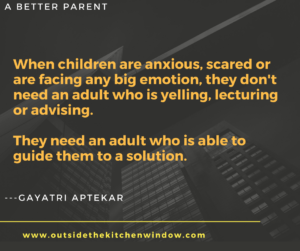We were getting ready to go to bed when my 9 -year old daughter said in a calm tone, “Mumma tomorrow is my IEO (English Olympiad) exam”
It was 10.30pm. She was unwell the last week so we didn’t practice and on the weekend I was busy with Storytelling. Amidst all this we forgot about the exam. Now the mother in me wanted to react…I wanted to give my daughter a lecture, maybe like this-
“What?? You’re telling me now, why didn’t you remind me earlier. Why did you go to play? Why didn’t you study? How can you forget? You’re so careless. You can’t even remember your exam dates” I could have done that and maybe that’s the easiest way to express our anxiety or fear or any big emotion we are going through, but I chose to ‘Respond’
I said, “Hmm both mumma and Samu forgot about it. Sometimes we do forget things. Now we can sit for quick 15 minutes and you can ask me any doubts you have.”
She quickly brought her IEO workbook and the next 15 minutes we were engrossed in solving the paper.
What surprised me was the way the things went smoothly and today morning she had more doubts. She even solved one more paper the next day morning.
All this happened because as a parent I chose to ‘Respond’. When children are anxious or scared or are facing any big emotion, they don’t need an adult who is yelling, lecturing or advising. They need an adult who is able to guide them to a solution and stand with them. That’s your responsibility as, ‘A Better Parent.’

One more situation, where we can learn to respond.
Suppose a child keeps losing new things that you buy for him or her. A pencil, eraser, sharpener or at times a child can misplace books.
How will most parents react?
“What you lost it again? How many pencils should I buy? You don’t value things. When will you learn to be responsible? Look at you friend/brother/sister, they are so careful. You’re so careless?”
Sounds like something you do often? It’s the easiest reaction. Now ask yourself, “Has your reaction brought a change in your child’s behaviour?” If yes, fantastic, but if no, then isn’t it time to shift your reaction and learn to respond.
What could be a better response?
“I’m observing that you’ve lost things or misplacing your valuable stuff, too often. Do you find it challenging to remember where you kept stuff? How can I help you in keeping things safely? Can we make a chart or something like that so you learn to take care of your belongings? What can we do to stop this behaviour? It’s a little challenging for me to keep buying new stuff often, so can we find a solution?”
How did you feel after reading the above response? Better? Calm? I’m sure your child will feel the same. He/she will feel better to know that you’re with them and are eager to find a solution, instead of nagging and yelling.
Today I want you to think which are some of the situations where you as a parent, react and how can you choose to Respond, effectively
For group or one-on-one coaching, therapy or storytelling events, kindly email your query to gs.apteka84@gmail.com. Together we can create a better and compassionate community!
Love and Gratitude,
Gayu
PS: For more everyday parenting tips and interesting discussions, follow me on Facebook- ‘A Better Parent’
Very true..most parents do respond in negative manner without realising its effect on kids.Very nice work from you..thanks for the post.
Very nice apt and educative narrative